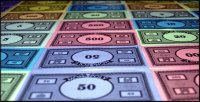All Bets Are Off Outside of Math Class
I learned this important lesson while teaching U.S. history to 11th graders several years ago: "All bets are off outside of math class."
Growth Economy Game
As part of our study of the rise of big business in late 19th century America, a colleague and I ran a multi-day simulation in which students became farmers, meat packers and cattle ranchers. The goal: make as much money as possible and stay in business. Students were given a set amount of startup cash from the Bank (us), and the Bank's goal was to make as much money as possible by enticing and encouraging these eager farmers, meat packers and cattle ranchers to ask for more money as their businesses evolved. Of course, the Bank set ridiculously high interest rates, but that did little to deter these eager students from wanting more and taking greater risk to strike it rich in late 19th century America.
As the game progressed, students realized that they could be more successful by joining together through vertical and horizontal integration. In fact, that was the ultimate objective of the game -- for students to realize the role of monopoly in late 19th century America.
The game involved basic math: addition, subtraction, multiplication and division. Students had to maintain a balance sheet and keep track of earnings and bank loans at interest. But the fundamentals of basic math eluded the students -- and my colleague and I could not believe it. These kids were taking pre-calculus, and some were even taking calculus, yet simple math confounded them outside of math class.
It all came down to context. They were adept problem solvers inside the cube of a carefully contained math class, but these students had not been asked to apply math in a novel context with a problem to solve at a rapid pace.
"Gaming" the Game
The energy of that multi-day simulation went unmatched each year. My colleague and I marveled at student motivation and innovation within the context of the game. The simulation hijacked all other classes as students plotted strategy, compared balance sheets and played with scenarios to maximize profit. The beauty of the game was the relative simplicity of its design, yet within the design there existed multiple layers of depth and complexity, depending how far students were determined to go to figure out a way to "game" the game.
And we could complicate student thinking by adding in a railroad strike to cripple grain transfer or inject disruptive weather patterns to force students to engage in non-routine problem solving.
Because of the game's open-ended nature, emphasis on collaboration, transdisciplinary focus, and challenge of juggling multiple variables, gameplay could permutate in unimaginable ways, all rooted in human behavior and the foibles of greed, ambition and temptation. Students learned a lot about themselves.
At the conclusion of the game, students had to pull together the factors and concepts at play by writing a story of their life on the ranch or in the big city. These stories served as a powerful assessment tool, and what became clear to us was how deeply they "got" the rise of big business in late 19th century America. And once we layered in the "real" story of what happened, the "aha" moments popped up left and right, with students saying things like, "That's what happened to me on day two of the game."
Assessment
Princeton University dropout Seth Priebatsch, CEO of SCVNGR, declares school to be the most poorly designed game there is in his TED talk, "The Game Layer on Top of the World."
He might be overstating things a bit, but his point rests on the idea that learning in schools lacks two key elements:
- The opportunity to level up at mastery
- The rush that games provide players through incessant challenge in new and novel contexts
The "experience" of the game creates lasting impact through having students "feel" failure, success and frustration. And students playing games demonstrate remarkable determination to get to the next level, despite encountering failure over and over again.
Games and simulations also teach resilience, perseverance, collaboration, ethics, creativity, time management and curiosity, all markers that the Mission Skills Assessment (MSA) tool is examining. The MSA is a collaboration of the Elementary School Research Collaborative and Educational Testing Services geared to understanding how to measure non-cognitive skill development. With its assessment of middle school students in independent schools, the MSA is aiming "to facilitate a dialogue and sharing network among schools on how to improve their ability to teach these [non-cognitive] skills."
The key element for schools is determining how to construct learning environments that expose students to the need for utilizing non-cognitive skills, and then measuring how well students are learning these skills. The "experience" of games, simulations or novel-context learning needs to be coupled with clear assessment. A "fun" game or simulation, constructed with careful attention to the development of core academic skills, can deepen learning and provide the opportunity for enduring understanding.
And, by taking learning out of the comfort zone of one discipline and applying it to novel situations that force students to use skills and content cutting across many disciplines, we can provide teachers with the opportunity to see if their students truly understand what is being taught.
As my colleague once stated, "All bets are off outside of math class."
